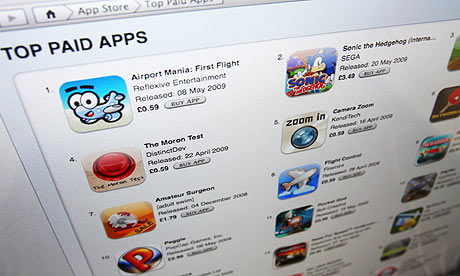Can you make it rich from an iPhone application?
- The Guardian, Thursday 28 May 2009

The App Store at the Apple website has more than 36,000 applications for download. Photograph: Graham Turner
Maybe – but even if you get into the charts, it may not be enough. Since Apple launched its application store last summer, a string of stories in the press have highlighted the lucky developers and programmers who have struck it rich through their iPhone programs.
But becoming an iPhone mogul is much harder than just hitting the charts, according to the LA-based developer Rick Strom. His applications do fairly well in the charts – Zen Jar (costing 99c) ranks around 30th in the App Store's social networking countdown, for example. However, he says, that means little in terms of downloads: roughly 35 a day, making little more than a dollar an hour after Apple takes its cut.
"Keep in mind there are over 36,000 apps in the App Store," he wrote on his blog . "If the apps on the category charts are doing those sorts of numbers, what do you think the rest of them are doing? Nothing. Absolutely nothing. They aren't selling at all."
Despite Strom's numbers, however, he admits that the figures start to rise sharply as you get towards the top end of the chart. For a start, hitting the top 25 gets you a far higher level of exposure, and a corresponding boost in downloads. In addition, some genres of applications are more profitable than others – games, for example, account for half of all the top downloads.
And they can accelerate quickly. According to Comscore, top titles have been downloaded by as many as 30% of users – and from an estimated user base of 15 million people in the US alone, that's around 5m purchases for No1 names such as Tap Tap Revenge.
There's no doubt that for the tiny echelon of top-selling apps, there is big money – but most of the sales and downloads are skewed towards the top of the charts.
The real problem, Strom says, is that "as software entrepreneurs … we measure the market by its huge successes" – and don't take into account the slim chance of success when spending thousands on developing a new program.
It's a classic situation familiar to everyone who's ever wondered why certain albums get glued to the top of the charts for weeks, while some musicians plug away for years in obscurity. Or how some books stick around the bestseller lists for long periods while good novels languish at the back of the shop. And it's a useful lesson to anyone preparing to buy into the plethora of other mobile app stores on the way, from the likes of Vodafone, Palm, Nokia and BlackBerry.
But whatever happens, you should be thankful that your app doesn't cause a different kind of trouble: just take the Fake Watch application, which riled the jewellery giant Cartier so much that it launched a lawsuit against Apple. In some cases, even getting on to the App Store at all could prove a lot more expensive than you think.
Original post: http://www.guardian.co.uk/technology/2009/may/28/iphone-apps
No comments:
Post a Comment
Please avoid profanities, swearing, curses and the like, and let's be civil with our comments. Thank you.
Norman